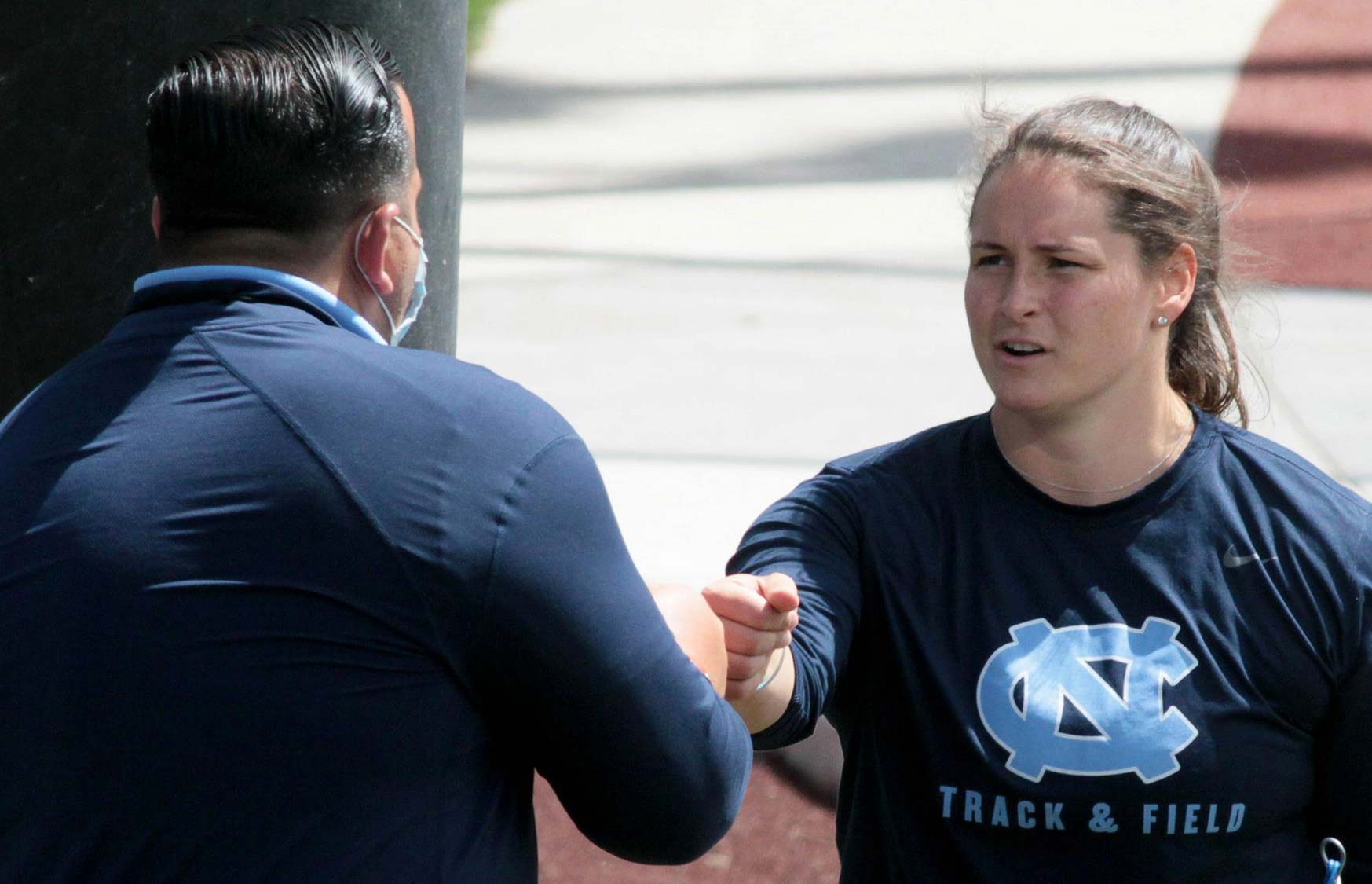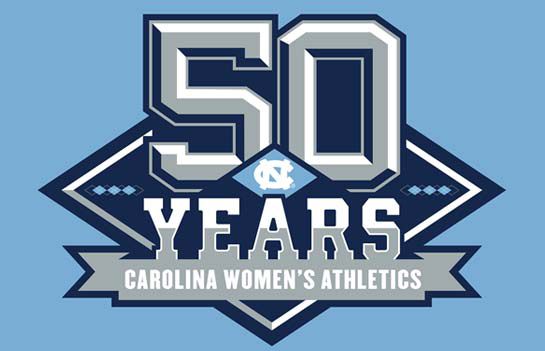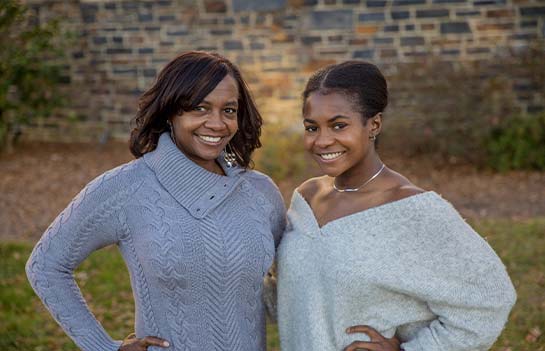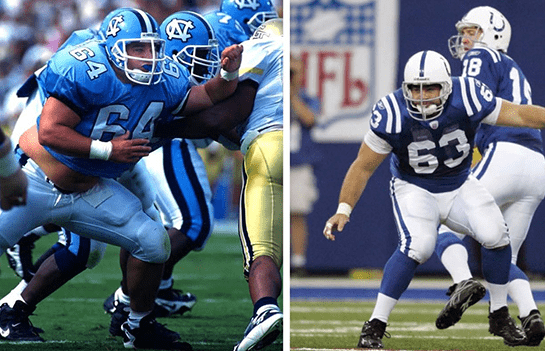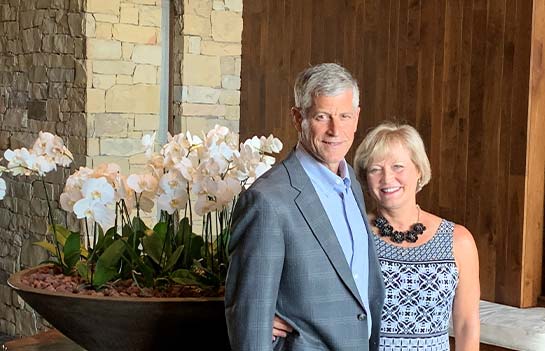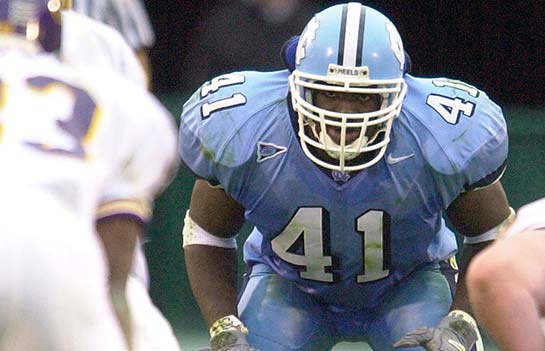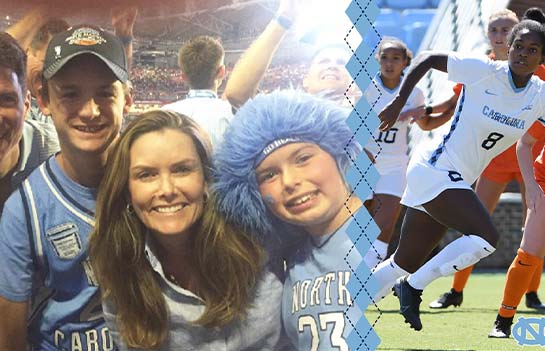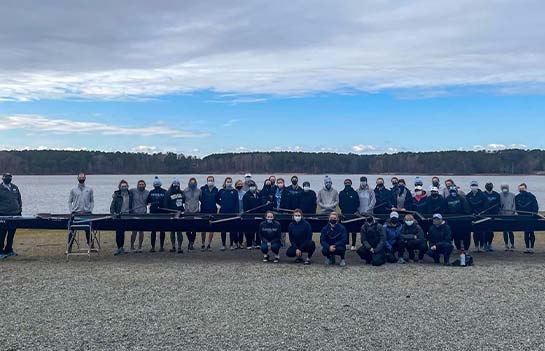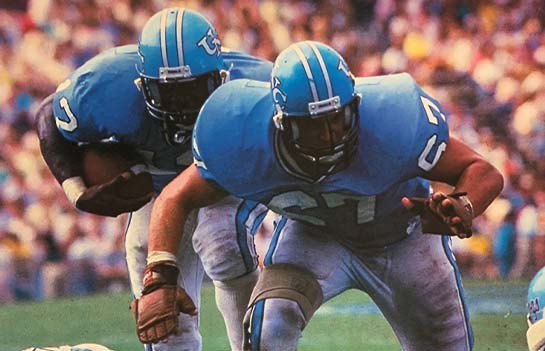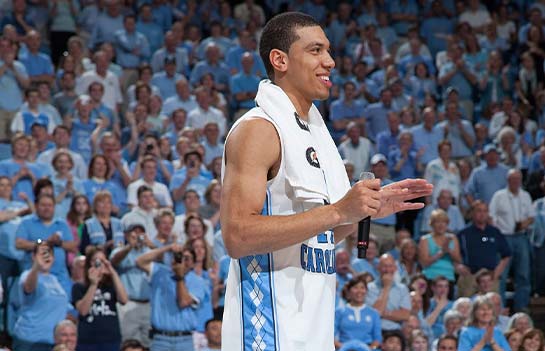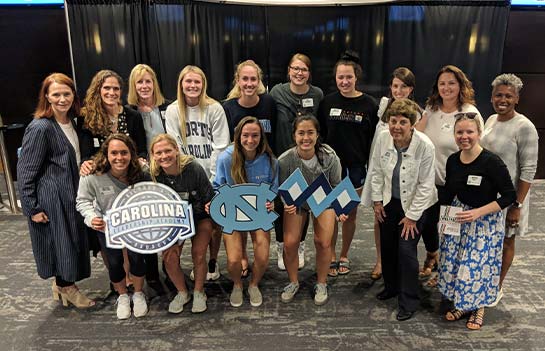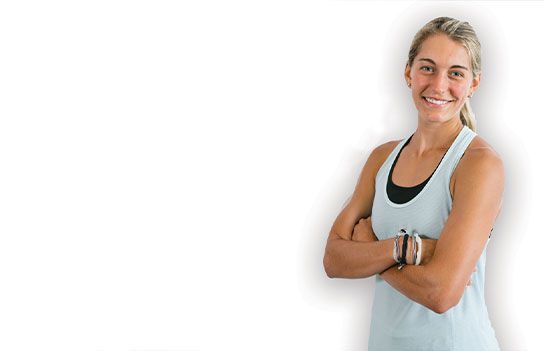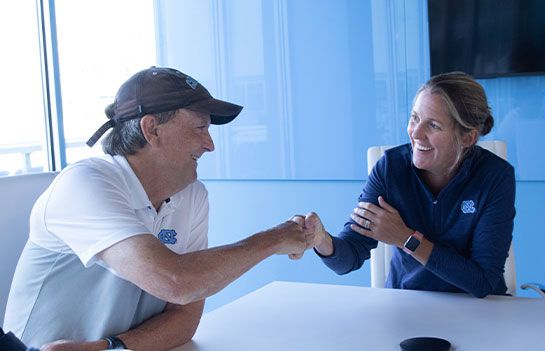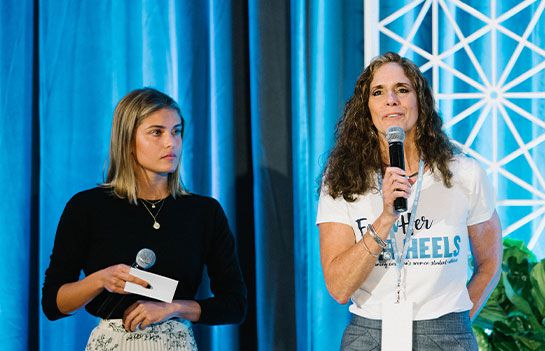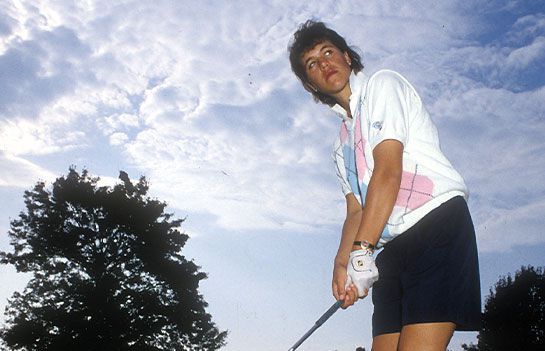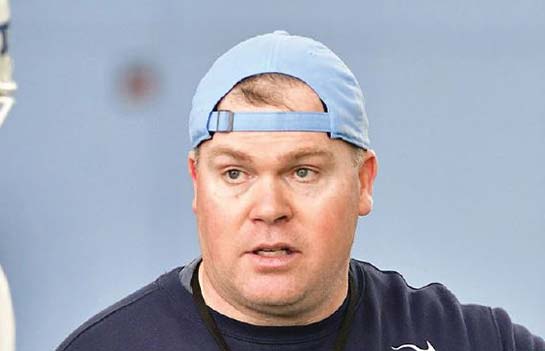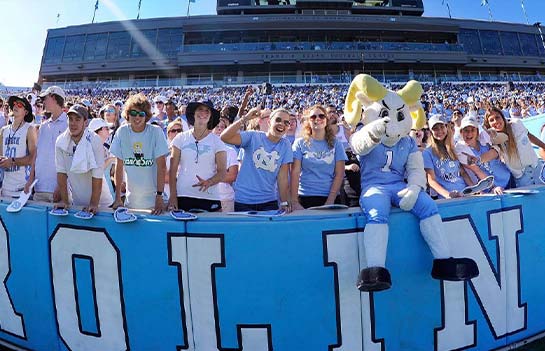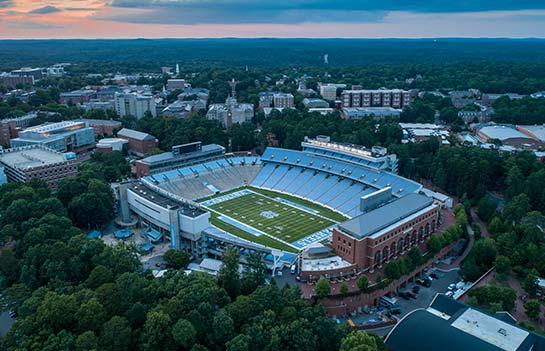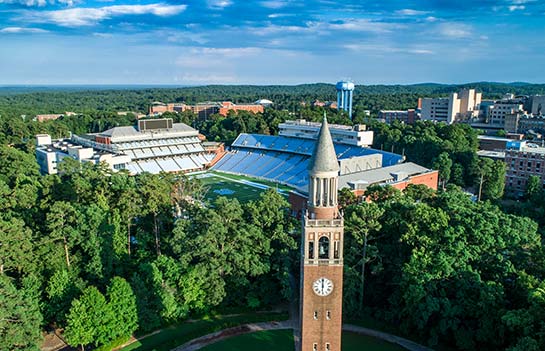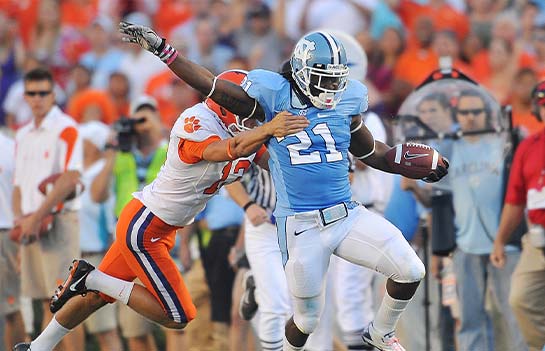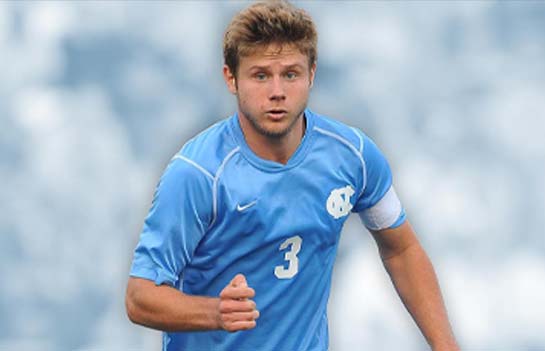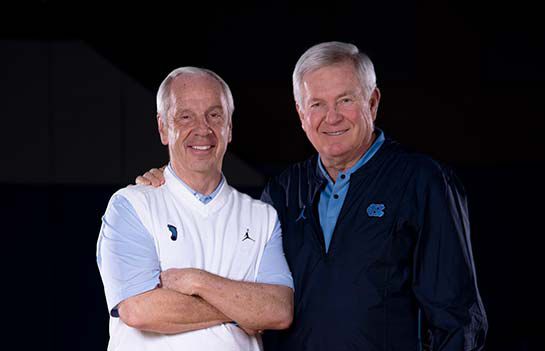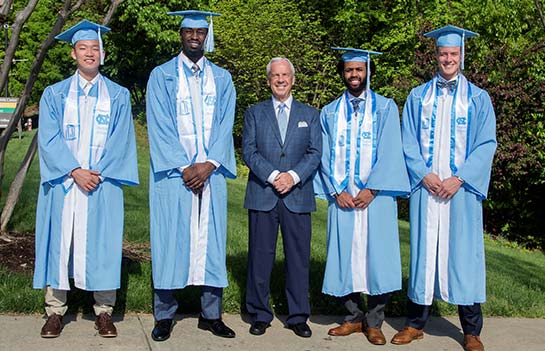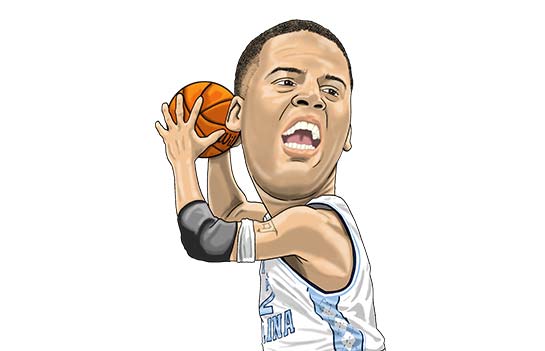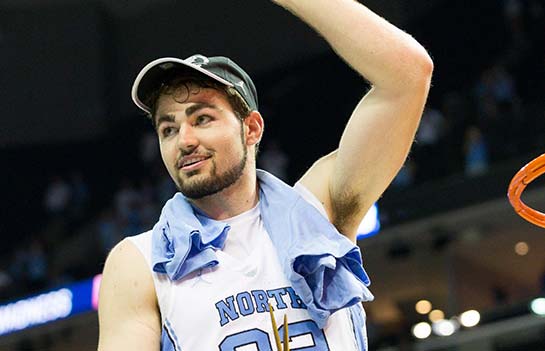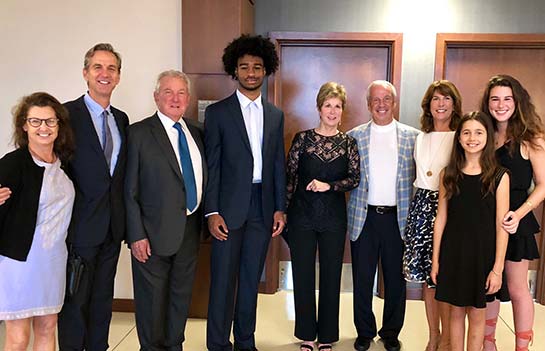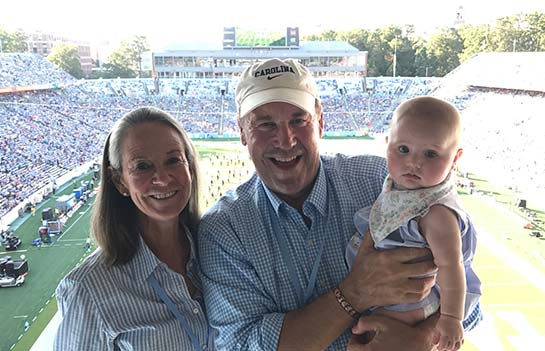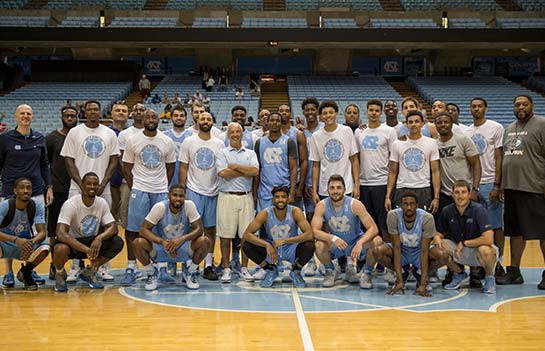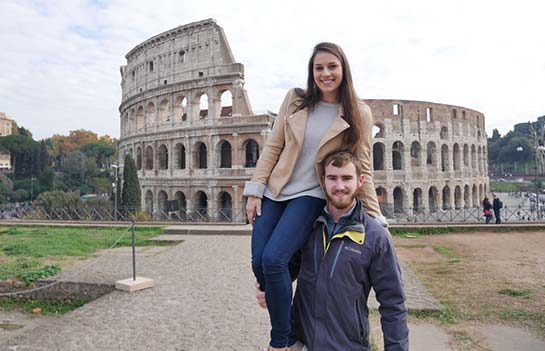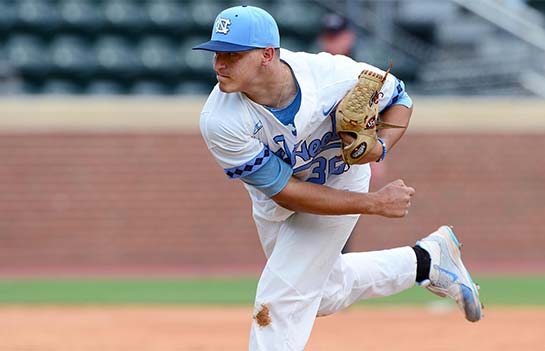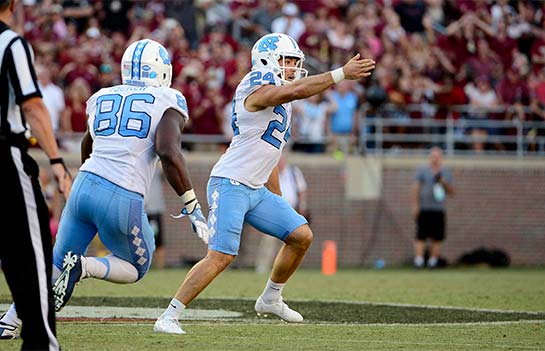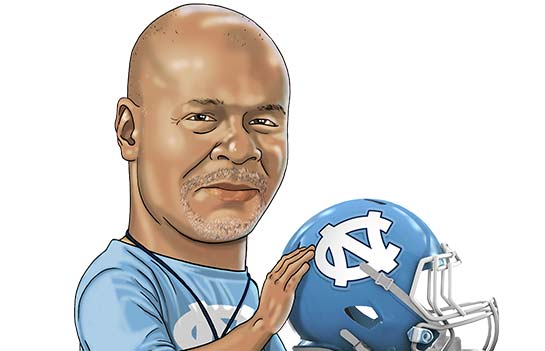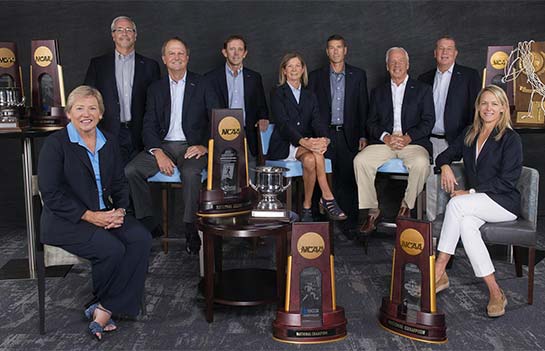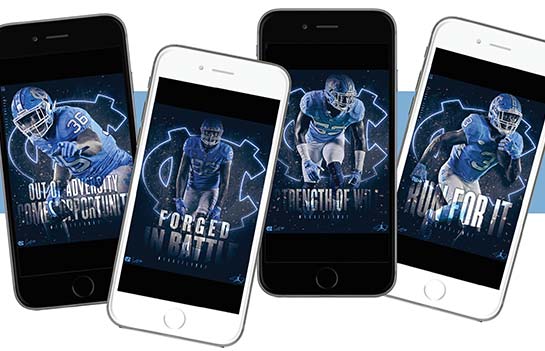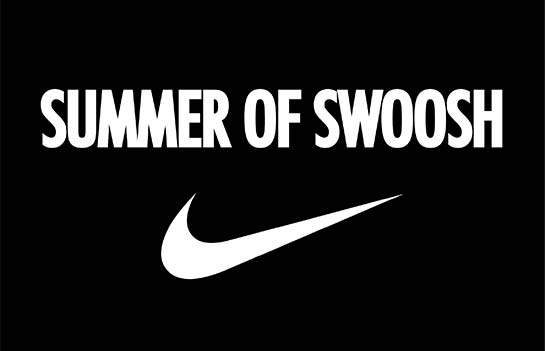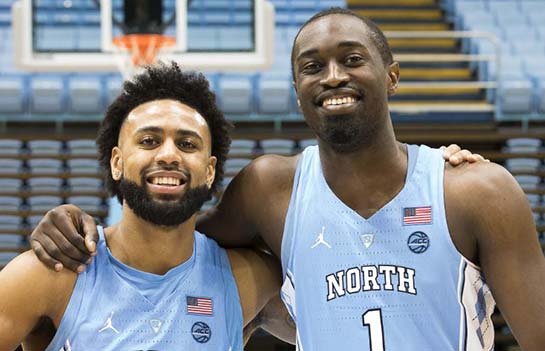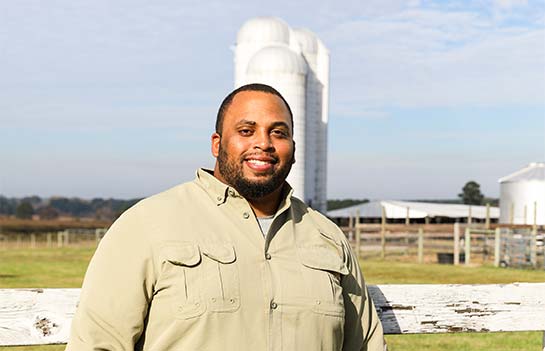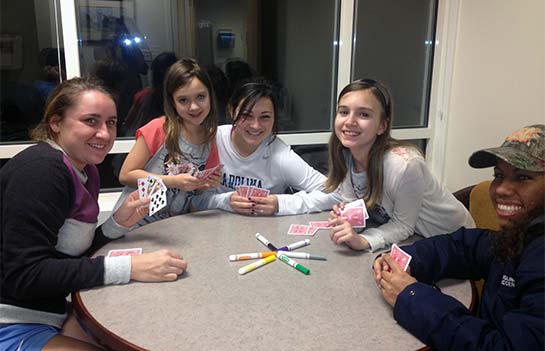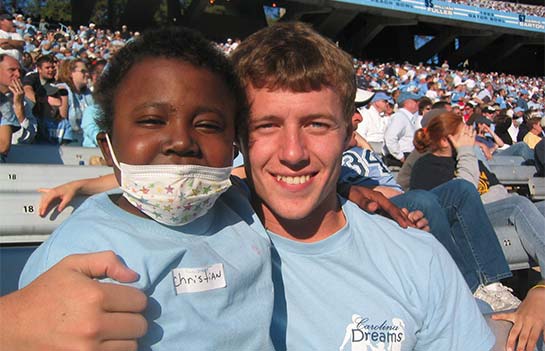TWO OF A KIND
Anson Dorrance and Courtney Banghart Joined the Carolina Athletic Department Four Decades Apart, but Have a Very Similar Approach
By Adam Lucas
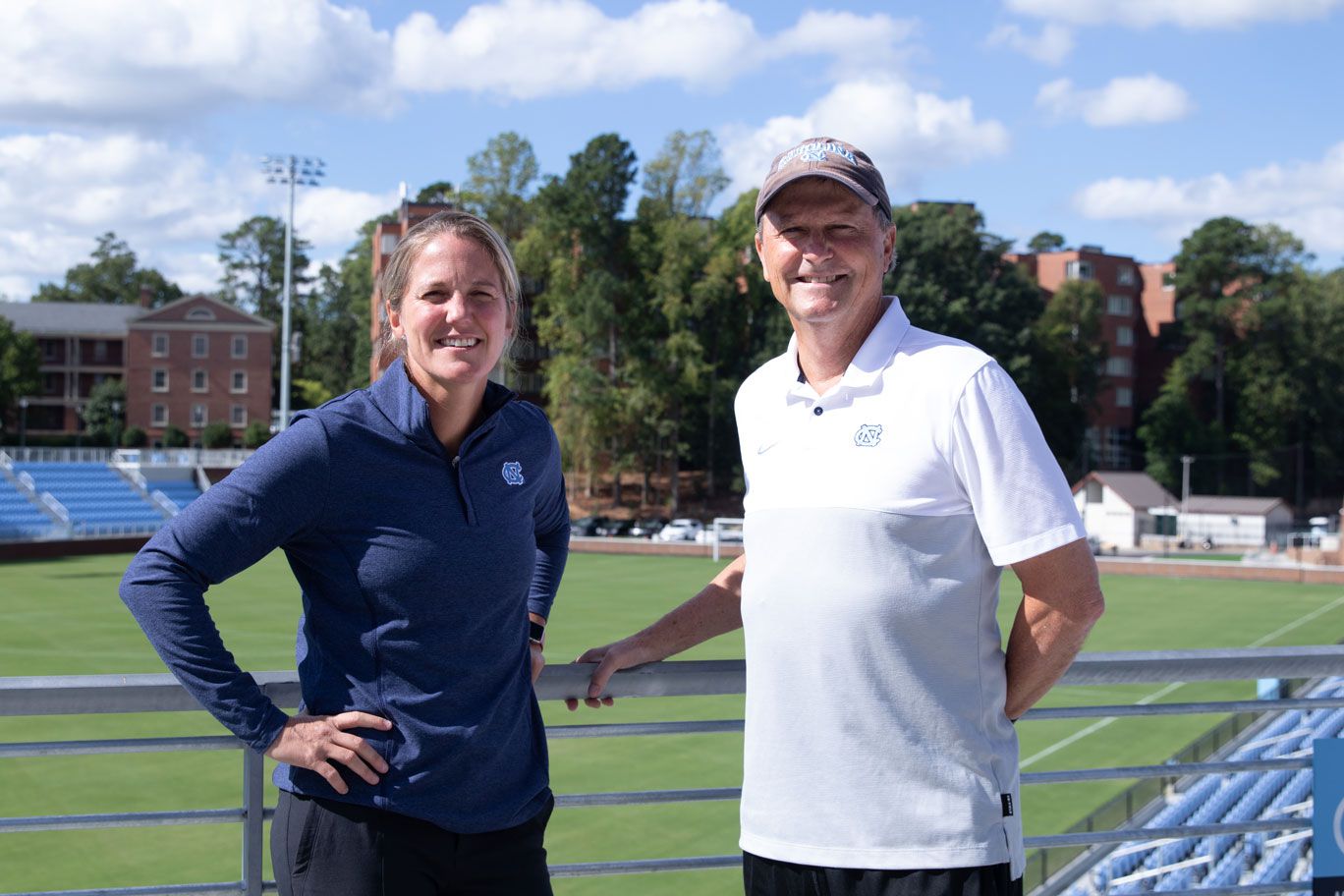
We sat down with one of Carolina’s longest-tenured coaches, women’s soccer coach Anson Dorrance, and one of the newest, women’s basketball coach Courtney Banghart, to discuss what it means to be part of Tar Heel women’s athletics. The duo actually met at the very outset of Banghart’s coaching career, when she embarked on a quest to meet with as many high-profile women’s coaches as possible as part of her graduate work. One of those stops brought her to Chapel Hill to meet with Anson Dorrance.
WHAT DO YOU REMEMBER ABOUT THE FIRST TIME YOU MET?
COURTNEY BANGHART: I had been in the area recruiting, and I was trying to find the best coaches, so I had met with Kay Yow and Gail Goestenkors. On a whim, I thought, “I’ll email Anson Dorrance and just see if he’ll answer me.” I was a soccer player growing up and he is synonymous with soccer. He responded within a day and asked what time was good for me. It was so easy. I showed up that day and no one greeted me. He was just sitting in his office. I don’t know what I expected, but I had met with Geno Aueriemma and some other big names, and they had these giant offices with huge shrines to their championships. I walked in to Anson’s office and there were so many national championship trophies they didn’t have enough space for them, so some of them were on the floor. And I wouldn’t exactly say he was the neatest guy in the world.
ANSON DORRANCE: I’m turning over a new leaf. When you see my new office, you will be stunned.
CB: Because it’s new?
AD: That’s correct. I’m trying to leave my messy habits behind. I’m trying to improve and I’m trying to live on the never-ending ascension, like we ask our kids to do. I’ve made a promise to myself and to the people who have to walk by that I will keep a neat office now.
CB: (laughs) You heard it here first. What impressed me about him was that he had won so much, but he hadn’t changed his core values. He’s a winner with a soul. He has a connection to his players. I left his office feeling like I could do it, and I could do it my way, because he has done it his way and been very successful.
WHAT’S SOMETHING WE WOULD FIND UNFATHOMABLE ABOUT WOMEN’S SPORTS AT CAROLINA IN THE EARLY 1980S?
AD: We had absolutely zero budget. For the first ten or 15 years of my coaching career I funded my recruiting budget out of my own pocket. I never turned in receipts for recruiting and it drove my wife crazy. I told M’Liss, “I’m investing in myself. We’re going to make this happen.” I knew we could do something special. The building she is talking about visiting me in did not have any heat. So in the winter I would wear this military ski jacket with a hood that I would sometimes have to put up. I’d sit in my office in front of a space heater in my heavy jacket plotting the conquest of the world as I saw it. I kind of liked it. We did some amazing things out of that ramshackle hut and the girls never suffered. If you care about the people you’re with, they don’t really see the surroundings. And now, when we bring in a kid to see our new palace, their jaws drop. And so does mine every day I come to work. We are absolutely spoiled now.
WHAT IS IT ABOUT CAROLINA THAT IS CONDUCIVE TO AN ENVIRONMENT OF SUCCESS?
CB: Princeton had never been to the NCAA Tournament when I got there, and now they’ve been eight of the last ten years. When you’re around winners, there’s a sense of camaraderie. It becomes less about you when your success is so similar to everyone else’s. That’s a great way to grow up as an athlete. You go to a soccer game and they’re in the top five in the country, football gets a huge win, and it’s hard to make it about you. The University knows how to win. It’s about getting the right people who care about competitive excellence broadly. You get the right kids when you care about broad excellence.
KNOWING WHAT YOU KNOW NOW, WOULD YOU HAVE ASKED ANY DIFFERENT QUESTIONS OR SAID ANYTHING DIFFERENT AT THAT FIRST MEETING?
CB: I would’ve asked the same questions, because I felt like my questions were authentic. I wanted to know about his own journey and how he ended up doing this. His journey was as circuitous as mine. When you come from an Ivy League background, you expect to go to college, you go to grad school, you work your way up from this job to that job. That’s not always how it happens in coaching.
I also wanted to know the times he took the harder right over the easier wrong. I wanted to know ways he showed he cared and ways he communicated. Those were things I knew at an early age were important to me, and he validated that those things were important in the coaching field. Most of my questions now would be about where are things and who gets things done?
AD: I would let her know that the budget sucks but hang in there. The cavalry is coming over the hill as soon as we figure out a way to sell the ACC Network and the budget will then compete with others nationally. We have wonderful leadership here up and down the organization. I’m praying Kevin Guskiewicz becomes the chancellor. Kevin comes from us. He understands our mission. We want athletics to have a legitimate mission within the ivory tower, and the thing I love about Kevin is he understands our role. We can be a positive part of the ivory tower. We can have an extraordinary marriage between athletic teams and our mission on campus.
Bubba Cunningham took a $90 million risk. He’s taken some fabulous risks to put us in a position where we can be the best of the best. As the ACC Network starts generating revenue and the rest of us support ourselves in a more aggressive fashion, this place will be transformed. We’re not looking back. We’re taking off and going forward. I love our marriage between athletics and the academic community, and I love the marriage between town and gown. The pieces are in place to take off. We’ve done extraordinary things, but the best is still ahead of us. This is a launch moment.
DEAN SMITH FAMOUSLY SAID THAT CAROLINA WAS A WOMEN’S SOCCER SCHOOL, AND THAT BASKETBALL WAS JUST TRYING TO KEEP UP. WHAT DID THAT QUOTE MEAN THEN, AND WHAT DOES IT MEAN NOW?
AD: Anyone who was here when Dean Smith was our leader understood what that meant. Here is an incredibly gracious man, and there was no truth to what he said – we were a basketball school. He was just giving us sunshine because that’s the nature of who he is, an incredibly humble, gracious man. He always went out of his way to help us, and that was one of many examples. We used that quote in recruiting in the most powerful way to give us credibility. There were people out there who actually believed what he said.
It also created this culture of, “I’m going to help you at any opportunity.” That’s how it works here. If I bring in an elite recruit and call Roy Williams at the last minute and ask if I can bring her by to meet with him tonight, he will clear his schedule and before you know it, he’s in front of that elite recruit. And all of a sudden, the kid is coming because Roy Williams took the time to help me. That started with Dean Smith. Roy and I are Dean Smith acolytes. We looked up to him and we understand he treated his lowliest manager with the same compassion and humanism with which he treated his greatest basketball star. He taught us how to treat people around us and a culture of respect for everyone.
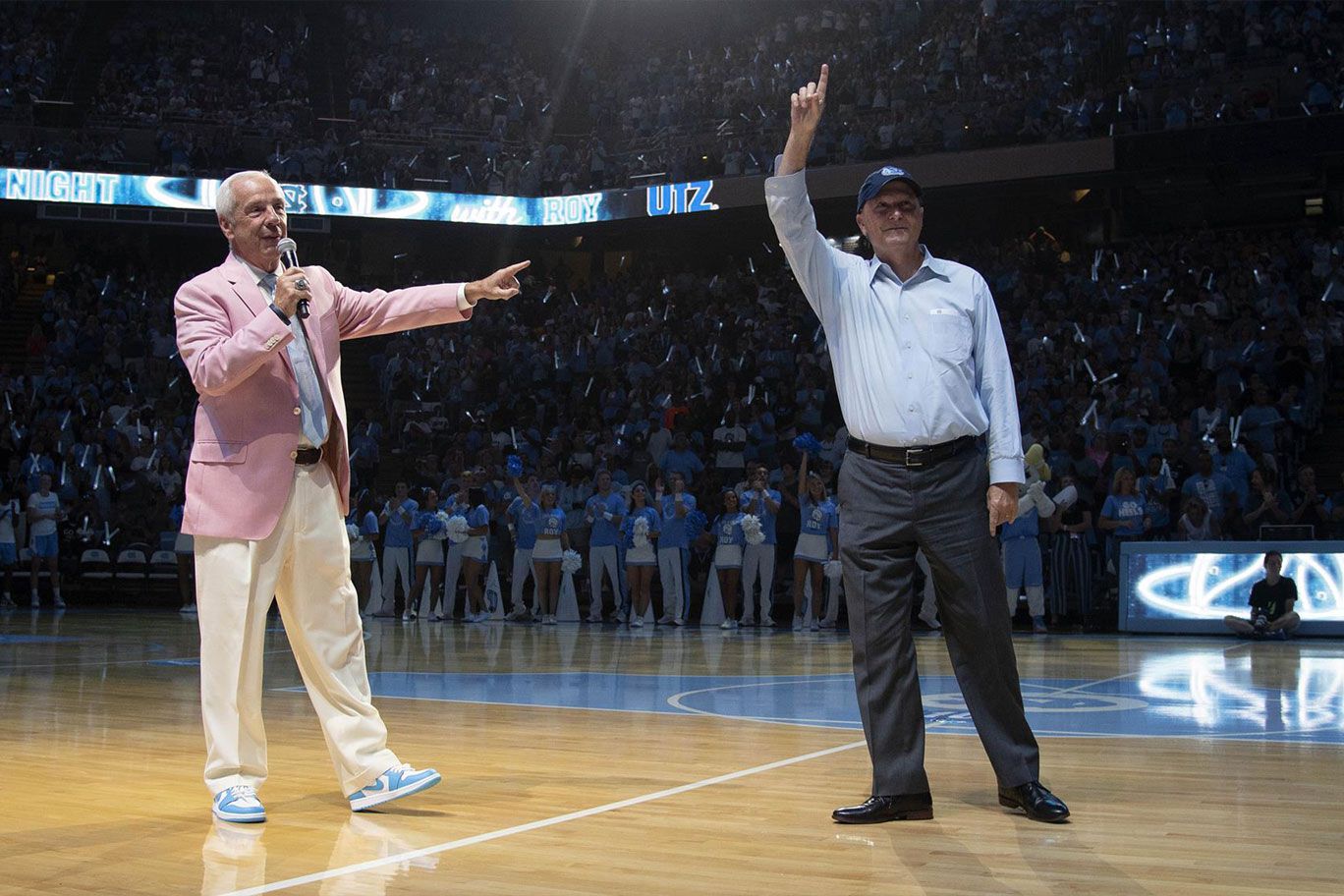
CB: From afar, I knew that Carolina was a basketball school. We try to promote that given that it’s our sport. But when we have top recruits here, Roy has met with them, Mack has met with them, Anson has met with them. This is a soccer school in soccer season, a football school on Saturdays, a field hockey school during the Final Four, a basketball school in basketball season, and many other sports. That competitive excellence is what drives me to keep up.
AD: What I love about Mack is he took the football program to a place it’s never been, and he did it out of the ashes. It wasn’t like he was given this huge gift and sustained it. He built the thing. He went off and won a national championship, but he came back. That speaks volumes for the place. He and Sally clearly loved it here. Now he’s back because he wants to leave the right kind of legacy. It’s not just a legacy about money. He’s coming back because he wants to leave a positive legacy with his sport at a place he loved when he was here. He is reaching back to help us. There’s something about this place you fall in love with. Even if you leave, it’s still part of who you are, and at the first opportunity, you come back. We’re celebrating his return. The first three home games were unbelievable.
CB: I bought a football jersey yesterday so I can wear it to the next game.
AD: He was so humble in that interview after the South Carolina game. He could’ve basked in the glory of the comeback, but he was incredibly humble. He listed all the mistakes he and his coaching staff made and gave his players full credit for the win.
CB: I texted him that night about his dance moves, and he texted me back and said, “My moves involved touching every part of my body that hurt.” He texted me back right away after the first game of the season. That’s the kind of person he is.
AD: I loved what he said after the game. It was so heartfelt. You could tell he really enjoyed being back in this place and succeeding again.
FROM THE OUTSIDE, WHY IS THAT “EVERYBODY IS IN IT TOGETHER” ATTITUDE APPEALING?
CB: When the Carolina job came open, our Princeton men’s basketball coach came and saw me and said, “Oh no.” We had worked together a while. I didn’t know what he was talking about. I was enjoying my current life. He said, “You’re going to leave us.” I told him I hadn’t even heard from them and didn’t know what he was talking about. He asked if he could have my permission to text Roy. He sent me the text he sent him and basically said Courtney is a great basketball coach but more than that, she is a great teammate. He said he would be sad to lose that but happy for Roy because Roy deserved to have someone like that. It was really thoughtful.
That was before I really got to know Carolina. From the outside, my legacy at Princeton was the winning. But I hope my legacy internally was that within the department, I became what Anson is – a connector of really good coaches. I was involved in all the searches to make sure the right coaches came to Princeton. Is it different? I don’t know, but it’s why I’m here and it’s what I did well at Princeton. It’s a really natural fit in that way.
WHAT’S NEXT FOR WOMEN’S SPORTS?
CB: What I’m promoting on the women’s basketball side is that when we get ourselves to a Final Four, we need Michael Jordan at the Final Four. Women’s basketball needs North Carolina to be good. Our brand is gigantic, especially for men. For women’s basketball to be relevant and continue to grow, we need to add more men fans to the game. There are a lot of people who will follow North Carolina women’s basketball because they like North Carolina. If we’re relevant on the national stage, we bring so many men to the game. It’s an enormous risk and an enormous opportunity. My only fear in life is regret. I was winning 25 games a year at Princeton. I was winning big, and all I wanted was to wake up in the morning and figure out how I could win even bigger. To leave that was really hard. As a competitor, all you care about is winning. But ultimately, I also care about being able to help the game of women’s basketball. And to grow the game, North Carolina women’s basketball has to be good.
AD: Courtney touched on this and we can be a leader in this area. Right now, the US Women’s National Team is fighting for equal pay. There’s a route to equal pay. The route is selling out your stadiums and charging a fee that justifies the fact that you’re marketing it. What I respect about Geno and UConn women’s basketball is they make money. Our moral imperative at Carolina for women’s soccer with this facility is to figure out a way to market it effectively. Fill it up and charge some money to become revenue neutral to some extent. We’re about to cross that line in women’s soccer. Look at the Women’s World Cup. They had sellouts almost every game for the United States team.
At the University of North Carolina, we have a chance to invest in marketing the women’s game. We have extraordinary coaches and extraordinary teams. So let’s take a bit of a risk. Right now everyone is saying why should we invest in anything other than men’s basketball and football, because those are the revenue drivers right now. Eventually there will be a visionary on the women’s side who says, “Let’s see what happens if we market our women effectively.” I think we’re the school to do it.
YOU’VE BOTH BEEN VERY UP FRONT ABOUT YOUR DESIRE TO NOT JUST WIN, BUT DOMINATE. WHAT’S CHANGED EITHER IN SPORTS OR IN OUR CULTURE THAT’S ENABLED WOMEN TO BE COMFORTABLE SAYING THEY DON’T JUST WANT TO PLAY, THEY WANT TO BE THE VERY BEST?
AD: All that’s changed is society’s perception. People don’t understand that there were women in 1980 or 1981 who felt that way. They just didn’t have a way to express themselves. When I was given the women’s team here for the first time, one of my huge advantages was that I had a younger sister named Maggie. Because of her, I never had the illusion that you couldn’t challenge women, because she dominated everyone. In my small world, the best athlete was my mother. She beat my dad in golf, she was a swimming champion, she was the top tennis player at her university. I was overseas and didn’t have television, and when I looked around in my small world, the best athletes were women.
My younger sister was ferocious. At my school in Nairobi, Kenya, it was an English school and did English sports, and we also boxed. They would give you these enormous gloves so you couldn’t generate enough momentum to hurt someone. My parents thought it would be entertaining to put some gloves on Maggie, who was younger than me by less than a year. She knocked a tooth down my throat. That lived in our family lore forever. But I never had the illusion that I had to condescend to train the women.
I was the men’s coach first, and I treated the women exactly the same way. I wanted them to compete. Those types of women have always existed. They’ve just never had the opportunity to express themselves. The only thing that changed was our perception of them, not the reality. Our culture was subjugating them and making them genuflect. We were trying to train them on the way we thought women should be. My favorite line in Mia Hamm’s book is, “When I got to North Carolina, I could finally be the person I was.” What person was she? She wanted to dominate. And her whole life she had to pretend she didn’t because of the way we try to guide women.
CB: My mom was also the better athlete in my family. When we played parent-child tennis tournaments, I always chose my mom. That’s how I grew up, and I think that makes you different. Anson grew up in an environment where the women were the dominators. I always thought it would be difficult for a man to coach women.
AD: Because they want to try to protect them.
CB: Exactly. I’ve always been a fan of women coaching women for that reason. Not because I’m trying to genderize the business. But because as a woman, I know how hard they can be pushed. I don’t want a guy coming in and treating us soft, because then we’re not going to grow.
More Stories
The impact of giving comes through in wonderful stories about Carolina student-athletes and coaches, as well as the donors who make their opportunities possible. Learn more about the life-changing impact you can have on a fellow Tar Heel through one of the features included here:
